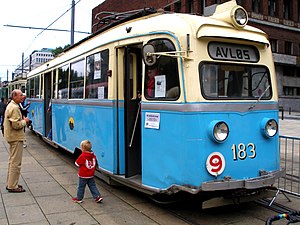| Class B and Class E "Gullfisk" | |
|---|---|
 A preserved Gullfisk | |
| Manufacturer | Strømmens Verksted |
| Constructed | 1937–1939 |
| Number built | 46 |
| Fleet numbers | 158–204 |
| Capacity | 44-49 seats |
| Operators | Oslo Sporveier Bærumsbanen |
| Specifications | |
| Car length | 15.40 m (50 ft 6 in) |
| Width | 2.50 m (8 ft 2 in) |
| Doors | 2 |
| Maximum speed | 65 km/h (40 mph) |
| Weight | 15.0 tons |
| Traction system | ELIN BBFa20 traction motors, 4 off |
| Power output | 146 kW (196 hp) |
| Electric system(s) | 600 V DC Overhead line |
| Current collector(s) | Pantograph |
| Track gauge | 1,435 mm (4 ft 8+1⁄2 in) |
Class B and Class E, normally referred to as Gullfisk (Norwegian for "goldfish"), were a class of 46 trams built by Strømmens Værksted and Skabo Jernbanevognfabrikk for Oslo Sporveier and Bærumsbanen of Oslo, Norway, in 1937 and 1939. They were the first aluminium trams to operate on the Oslo Tramway and the first bogie trams to operate on street lines. They had contemporary modern electronic equipment, a streamlined shape, and comfortable accommodation. Until 1964, they were also faster than any other Norwegian tramcar or suburban railcar.[1]
Six prototype trams were delivered by Strømmen in 1937, with four different motor solutions, from AEG, Siemens, Vickers and Norsk Elektrisk & Brown Boveri (NEBB). None of these were particularly successful, and the 40 serial production trams used conventional motors from ELIN. These were delivered in 1939, with 20 (class E) being used by Oslo Sporveier mainly on the Kjelsås Line, but also on other services. The remaining 20 trams (class B) were leased to Bærumsbanen, that used them on the Kolsås and Østensjø Lines, and later on the Ekeberg Line.
From 1967, Oslo Sporveier transferred all its trams to Bærumsbanen, where they remained in use until 1985. The class has been involved in several fatal incidents, including the Strømsveien tram fire in 1958. Six trams (prototype no 163, nos 166, 170, 196 and 199) remain at the Oslo Tramway Museum; whilst Oslo Sporveier has kept two and converted them to maintenance vehicles (nos 185 and 198), painted them yellow with zebra stripes. They also kept one themselves as a veteran tram (no 183).
- ^ Norske lok og motorvogner [Norwegian locomotives and power units] (in Norwegian). Norwegian Railway Club. 1 January 1978. ISBN 82-90286-00-7.